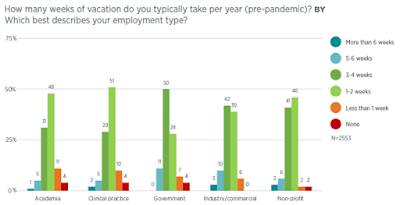As a veterinary professional, the days you spend caring for others can be fulfilling. But, over time, they also can be exhausting and lead to compassion fatigue. Your mental and physical health affects your ability to provide excellent care, so maintaining your personal wellbeing should be a top priority – as should supporting the wellbeing of those around you.
A fundamental step to decreasing workplace fatigue is taking time off and using your vacation days. Allowing yourself to recharge outside of work can increase your passion for your career.
Results from the AVMA Trust 2022 Trend Report: U.S. Veterinarians’ Work-Life Experience1 show a statistically significant relationship between the amount of vacation a veterinarian takes and their overall job satisfaction. As one veterinarian so aptly put it, “it is important to take time off to reset your life and be able to better serve your clients and patients. You cannot serve from an empty cup.”
The mean job satisfaction for all veterinarians is 7.1 out of 10, and most take one to two weeks of vacation per year (pre-pandemic). Satisfaction among those who take one week or less is significantly lower than those who take upwards of four weeks. Those who take “none at all” have the lowest job satisfaction ratings of all veterinarians regardless of age or career stage.
Advice from seasoned DVMs poured in via the survey that supports the data. These thoughtful insights paint a clear picture of what benefits come from taking an appropriate amount of time off, as well as supplying strategies to avoid feeling guilt or shame from taking PTO or vacation.
A fundamental step to decreasing workplace fatigue is taking time off and using your vacation days. Allowing yourself to recharge outside of work can increase your passion for your career.
Results from the AVMA Trust 2022 Trend Report: U.S. Veterinarians’ Work-Life Experience1 show a statistically significant relationship between the amount of vacation a veterinarian takes and their overall job satisfaction. As one veterinarian so aptly put it, “it is important to take time off to reset your life and be able to better serve your clients and patients. You cannot serve from an empty cup.”
The mean job satisfaction for all veterinarians is 7.1 out of 10, and most take one to two weeks of vacation per year (pre-pandemic). Satisfaction among those who take one week or less is significantly lower than those who take upwards of four weeks. Those who take “none at all” have the lowest job satisfaction ratings of all veterinarians regardless of age or career stage.
Advice from seasoned DVMs poured in via the survey that supports the data. These thoughtful insights paint a clear picture of what benefits come from taking an appropriate amount of time off, as well as supplying strategies to avoid feeling guilt or shame from taking PTO or vacation.
“Be a hard worker but take enough time off to live your life and avoid burnout. Have veterinary medicine be what you do, not who you are.”
“Always have a plane ticket in your possession. It may not leave for 10 months but have that carrot in front of you.”
“Your practice won't die if you miss an afternoon here or there.”
“Once every three months, take time off, even if it's extended weekend of cooking for friends and family, hiking, or gardening.”
“No one is going to take your time off for you if you don't take it.”
“Choose life and use all your vacation time that's allotted to you.”
“Schedule time off yearly and don't worry that the clients will leave. They will be there when you get back. You will be more productive with a regular dose of R&R.”
“It is okay to actually be away on time off. Take time off and do not feel guilty when you take time for yourself. You need to set time aside for yourself, your family, and friends.”
1The AVMA Trust 2022 Trend Report: U.S.
Veterinarians’ Work-Life Experience is based on a national survey conducted
in fall 2021. N=2,553 Practicing Physicians. N=327 Retired Veterinarians. 95%
confidence, ± 3% margin of error.


